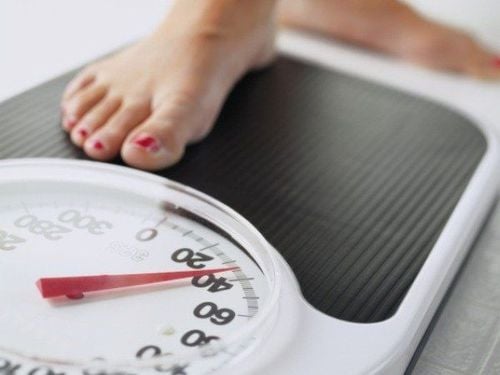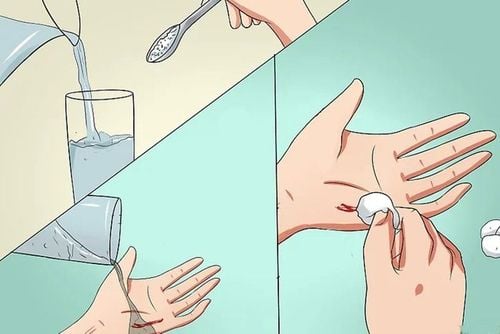This is an automatically translated article.
“Hydrotherapy” is a method of using water for treatment or health care, in which the temperature of the water plays an important role. Many studies have shown the benefits of cold and hot showers for each case. This article will share the benefits as well as the disadvantages of hot showers and cold showers.
1. Uses of hot bath
Hot showers can also have beneficial effects on health. Some examples of the benefits of a hot bath include:
1.1. Improve heart health
A study from 2014 states that a hot bath can improve blood circulation in people with chronic heart failure, this is due to the natural dilation of blood vessels when exposed to high temperatures.
A 2012 study also discovered that soaking your feet in hot water can also reduce the hardening of the arteries, thereby reducing the risk of atherosclerosis leading to high blood pressure.

Tắm nước nóng có thể cải thiện được sức khỏe tim mạch
1.2. Improve muscle and joint flexibility
As mentioned above, a hot bath can enhance blood flow, helping to loosen stiff joints and tired muscles. Meanwhile, a cold shower can reduce inflammation and relieve pain at the same time.
A study from 2017 evaluated the effects of hot and cold water on patients with knee osteoarthritis and found reduced pain as well as a slight improvement in knee function.
1.3. Increase brain health
A study from 2018 investigated the effects of hot water on brain function, resulting in a hot bath:
Promotes the persistence of the neurotrophic active ingredients BDNF. Development and maintenance of nerve cells. Increase the ability to learn and remember. A small study divided eight people into two groups: one group took a 20-minute bath in hot 42 degrees Celsius, the other 20 minutes in warm 35-degree water. Participating in a hot bath had a significantly higher level of brain neuron metabolism. The researchers concluded that the hyperthermia caused by hot baths boosted brain health.
1.4. Help sleep better
Many health experts recommend taking a hot bath 1-2 hours before going to bed as a way to improve sleep. Taking a hot bath can help people fall asleep because the body relaxes, relaxes during the bath, and slowly lowers its natural temperature afterward.
SEE ALSO: Reasons to take a warm bath after swimming to protect your skin

Tắm nước nóng có thể giúp bạn ngủ ngon hơn
2. Uses of cold water bath
Although, not everyone has the courage to take a cold shower, but according to many studies it can provide certain health benefits, for example:
Reduce inflammation and swelling. Reduce muscle spasms. Has a pain-relieving effect. An older study from 2000 examined the effects of different water temperatures on the body's response. Specifically, researchers immersed participants in 14°C water for 1 hour and observed the following changes (some of which may not necessarily be healthy):
Increased the metabolism . Increased heart rate and blood pressure. Increased levels of the neurotransmitters Dopamine and Norepinephrine. Reduces the "stress hormone" Cortisol. Some of the beneficial effects of cold showers include:
2.1. Improve blood circulation
Exposure to cold water causes the capillaries on the surface of the skin to constrict, thereby redirecting the flow of blood away from the surface of the skin. A 2019 study found that taking a cold shower after exercise can lower body temperature and improve hydration (water retention and hydration). As blood moves away from the skin, the blood vessels in the deeper tissues dilate, which improves circulation in this area.
2.2. Reduces Cortisol Levels
Cortisol is often referred to as a “stress hormone” that the body releases in response to stress. Therefore, lowering blood cortisol levels can help reduce stress levels significantly. Take a shower or soak in a cold bath, your body's cortisol levels will drop.

Tình trạng căng thẳng có thể được cải thiện nhờ việc ngâm nước lạnh
2.3. Pain relief
According to a review from 2014, exposure to cold water activates the body's automatic analgesic response (SIA). SIA is an adaptation with pain relief during or after exposure to a stressor, such as cold water immersion.
2.4. Relieve muscle aches and sports fatigue
A study from 2009 examined the effects of cold showers on the physical performance of athletes. After a workout, some athletes are given a cold shower, while others are bathed in warm water. Although there was no difference in subsequent physical performance between the 2 groups, the sensations of muscle soreness and fatigue were significantly lower in the cold bath group than in the control group. This psychological effect could be useful in competitive, competitive sports.
MORE: Should pregnant women take a hot bath?
3. So when to take cold and hot showers?
Doctors sometimes recommend heat and cold hydrotherapy for patients with muscle or bone injuries. However, it is not clear whether hot or cold showers are as effective as ice or heat. Some people with arthritis prefer a hot shower in the morning because it helps them feel better. However, cold showers are beneficial for inflammatory injuries.
As for taking a hot bath to improve sleep quality, a 2019 study found that the best time to take a shower or bath is 1-2 hours before bed. However, people with eczema and skin rashes should avoid hot baths altogether, as they can make the skin drier.

Tắm nước lạnh có lợi cho bệnh nhân viêm khớp
4. Potential dangers
Bathing for a long time or with water that is too cold or too hot can both increase and decrease body temperature excessively. If bathing in cold water is excessively cold and allowing a person's body temperature to drop below 32.2 degrees Celsius, they may experience:
Decreased breathing rate. Lower blood pressure. Abnormal heart rate. Reduced cognitive ability. If the bath is too hot, people are at risk of burns and heat stroke. Therefore, as long as temperatures that are too high or too low are avoided, cold and hot showers can both provide certain health benefits.
Please dial HOTLINE for more information or register for an appointment HERE. Download MyVinmec app to make appointments faster and to manage your bookings easily.
Reference sources: Medicalnewstoday, runnersworld.com













